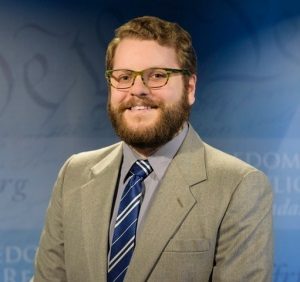A secular group opposed to excessive entanglement of church and state says a new prison seminary program set to begin this fall in Arkansas may be unconstitutional.
The Wisconsin-based Freedom From Religion Foundation sent a letter June 21 asking the Arkansas Department of Corrections to suspend a partnership with Mid-America Baptist Theological Seminary and the Arkansas Baptist State Convention to establish a seminary inside the Varner/Varner Supermax Unit located 28 miles south of Pine Bluff.
“This is a Baptist course of study, offered by a Baptist theological seminary, working in concert with a Baptist organization whose primary purpose is to proselytize.”
The program, with an initial cohort of 25 male inmates, is one of a number of privately funded Christian ministries offering inmates free, on-site college degrees modeled after a seminary extension center behind bars at the Louisiana State Penitentiary in Angola pioneered by New Orleans Baptist Theological Seminary in 1995.
“We want the inmates to be field ministers who will go unit to unit once they receive their degree and assist us in caring for our population,” Arkansas Department of Corrections Deputy Director Dexter Payne said April 30 in an announcement at the state capitol reported by the Arkansas Baptist News, “teaching them, mentoring them and giving them a vision that will help them once they go outside of our gates.”
Gov. Asa Hutchison, in a video message, called it “a remarkable opportunity for inmates to learn more about biblical principles and powerfully influence the lives of others as they begin their journeys as ministers of faith.”
The Global Prison Seminaries Foundation maps 15 existing prison seminary programs across the United States, with 10 more being negotiated or planned and a goal of 40 such programs by the year 2023.
The “moral rehabilitation” philosophy wins praise for reducing prison violence and recidivism rates, but some say it transgresses the constitutional principle of church-state separation by favoring Christianity over other faiths or no religion at all.

Colin McNamara
Freedom From Religion Foundation fellow Colin McNamara said in his recent letter to Department of Corrections compliance director Mark Colbert that running a Baptist seminary inside a state prison has “grave ramifications” for the Establishment Clause.
“It is illegal for correctional institutions to condition any benefit to inmates on their attendance at religious programs,” said McNamara, Robert G. Ingersoll Legal Fellow for the non-profit foundation incorporated in 1978 “to promote the constitutional principle of separation of state and church and to educate the public on matters relating to nontheism.”
“While this seminary program is not a Sunday church service, it is beyond reasonable dispute that this is an overtly religious program, the goal of which is to train missionaries,” McNamara said. “The opportunity to earn a bachelor’s degree is undoubtedly a substantial benefit, one which is particularly attractive to those who might otherwise never have a chance at higher education.”
“However, as it stands, any Varner Unit inmate wishing to better himself through education must also be subjected to religious instruction,” he continued. “Further, this religious program centers wholly around one denomination of the Christian faith.”
“The plain facts are these,” McNamara said. “This is a Baptist course of study, offered by a Baptist theological seminary, working in concert with a Baptist organization whose primary purpose is to proselytize.”
The Global Prison Seminaries Foundation is led by Burl Cain, who served more than 20 years as warden at the Louisiana State Penitentiary in Angola, once nicknamed Alcatraz of the South and reputed to be the bloodiest prison in America.
“Imagine the public outcry that would arise if the state were to partner with Muslim institutions and train them to be imams and turn them out to minister Islam to other inmates.”
Through initiatives including the Bible college in conjunction with New Orleans Baptist Theological Seminary, according to the ministry website, Angola under his leadership “became one of the safest, most secure, and progressive maximum security prisons in the nation.”
The prison seminary model requires that the sponsoring school not receive any funding from the inmates or department of corrections.
“The curriculum must be geared toward moral rehabilitation,” says an online description. “All faiths are welcomed, but the student must realize the course of study will include Biblical tenets. Being confronted with the teaching and life of Jesus, specifically issues of servanthood, social justice, forgiveness, loving others, and the like, demand a response.”
Americans United for Separation of Church and State raised constitutional concerns when the Texas Department of Corrections promoted a similar four-year college program sponsored by the Southwestern Baptist Theological Seminary, Southern Baptists of Texas Convention and Heart of Texas Foundation in 2011.
“Imagine the public outcry that would arise if the state were to partner with Muslim institutions and train them to be imams and turn them out to minister Islam to other inmates,” said Alex J. Luchenitser, associate legal director of Americans United for Separation of Church and State.
The 1,400-church Arkansas Baptist State Convention is affiliated with the Southern Baptist Convention. Mid-America Baptist Theological Seminary, located across the street from Bellevue Baptist Church in Cordova, Tennessee, was established in the 1970s as a conservative alternative to six seminaries operated by the Southern Baptist Convention.
